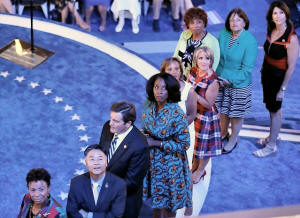|
Exclusive: FBI probes hacking of
Democratic congressional group - sources
 Send a link to a friend
Send a link to a friend
 [July 29, 2016]
By Joseph Menn, Dustin Volz and Mark Hosenball [July 29, 2016]
By Joseph Menn, Dustin Volz and Mark Hosenball
SAN FRANCISCO/WASHINGTON (Reuters) - The
FBI is investigating a cyber attack against another U.S. Democratic
Party group, which may be related to an earlier hack against the
Democratic National Committee, four people familiar with the matter told
Reuters.
The previously unreported incident at the Democratic Congressional
Campaign Committee, or DCCC, and its potential ties to Russian hackers
are likely to heighten accusations, so far unproven, that Moscow is
trying to meddle in the U.S. presidential election campaign to help
Republican nominee Donald Trump.
The Kremlin denied involvement in the DCCC cyber-attack. Hacking of the
party's emails caused discord among Democrats at the party's convention
in Philadelphia to nominate Hillary Clinton as its presidential
candidate.
The newly disclosed breach at the DCCC may have been intended to gather
information about donors, rather than to steal money, the sources said
on Thursday.
It was not clear what data was exposed, although donors typically submit
a variety of personal information including names, email addresses and
credit card details when making a contribution. It was also unclear if
stolen information was used to hack into other systems.

The DCCC raises money for Democrats running for seats in the U.S. House
of Representatives. The intrusion at the group could have begun as
recently as June, two of the sources told Reuters.
That was when a bogus website was registered with a name closely
resembling that of a main donation site connected to the DCCC. For some
time, internet traffic associated with donations that was supposed to go
to a company that processes campaign donations instead went to the bogus
site, two sources said.
The sources said the Internet Protocol address of the spurious site
resembled one used by Russian government-linked hackers suspected in the
breach of the DNC, the body that sets strategy and raises money for the
Democratic Party nationwide.
Cyber security experts and U.S. officials have said there was evidence
that Russia engineered the DNC hack to release sensitive party emails in
order to influence the U.S. presidential election.
"I have concerns that an agency of foreign intelligence is hacking and
interfering with a U.S. election," said Clinton campaign chairman John
Podesta, who added he had not seen news of the DCCC attack.
Asked by Reuters to comment on whether Russia played a role in a
cyber-attack on the DCCC, Kremlin spokesman Dmitry Peskov said: “We
don’t see the point any more in repeating yet again that this is
silliness.”
The release of the DNC emails by activist group WikiLeaks caused uproar
in the party because they appeared to show favoritism within the DNC for
Clinton over U.S. Senator Bernie Sanders of Vermont, who ran a close
race for the nomination for the Nov. 8 election. The committee is
supposed to be neutral.

The DNC and the DCCC share the same office space on South Capitol Street
in Washington.
The DCCC and donation processing company ActBlue had no comment on
Thursday. CrowdStrike, the California-based cyber security firm that
investigated the DNC breach, declined to comment.
Justin Harvey, chief security officer at Fidelis Cybersecurity company,
said the suspect website in the hack was affiliated with others that
host sophisticated malware undetected by the vast majority of antivirus
providers.
"It's really rare malware," which would be more likely to be wielded by
government hackers than ordinary criminals, he said.
GREAT CONCERN
Russian officials have dismissed allegations of Moscow's involvement in
hacks of U.S. political groups. "It is so absurd it borders on total
stupidity," Kremlin spokesman Peskov said on Thursday.
[to top of second column] |

Congressional candidates running for office and being supported by
the Democratic Congressional Campaign Committee at the Democratic
National Convention in Philadelphia. REUTERS/Rick Wilking

Some Democratic officials have accused Russia of hacking the DNC
emails in order to help Trump win the race for the White House.
"It's no coincidence someone is hacking into Democratic Party
computers. It's almost sounding like a repeat of Watergate,"
Gilberto Hinojosa, the chairman of the Texas Democrats said, after
Reuters reported the DCCC hacking.
"This is just the kind of dirty politics we expect from Donald
Trump. I have no doubt Donald Trump is behind it," he said, citing
the businessman's praise of Russian President Vladimir Putin and
recent remarks about Russia and Clinton's deleted emails.
Trump angered Democrats this week by inviting Russia to unearth tens
of thousands of emails from rival Clinton's tenure as U.S. secretary
of state. Trump said on Thursday his comment was meant to be
sarcastic.
Jim Manley, a Democratic strategist who once worked for Senate
Minority Leader Harry Reid, said the possibility of the DCCC being
hacked was cause for great concern.
“Until proven otherwise, I would suggest that everyone involved with
the campaign committee operate under the assumption Russians have
access to everything in their computer systems,” Manley said.
The Federal Bureau of Investigation referred questions about the
DCCC attack to a statement it made on Monday about the DNC hack:
"The FBI is investigating a cyber intrusion involving the DNC and
are working to determine the nature and scope of the matter. A
compromise of this nature is something we take very seriously, and
the FBI will continue to investigate and hold accountable those who
pose a threat in cyberspace."

Director of National Intelligence James Clapper said on Thursday the
U.S. intelligence community was not ready to "make the call on
attribution" as to who was responsible for the DNC hack.
Clapper, speaking at the Aspen Security Forum, acknowledged:
"There’s just a few usual suspects out there" who might be
responsible for the cyber intrusion, suggesting it was the work of a
state actor rather than an independent hacking group.
Clapper said in May he was aware of attempted hacks on campaigns and
related groups and he expected to see more as the November election
neared. The last two U.S. presidential cycles in 2008 and 2012
witnessed a barrage of cyber attacks from a range of adversaries
targeting President Barack Obama's campaign and the campaigns of his
Republican foes, officials have said.
(Additional reporting by Warren Strobel in Aspen, Colo., Yara
Bayoumy and Ginger Gibson in Washington, Amy Tennery Luciana Lopez
in Philadelphia and Christian Lowe in Moscow; writing by Alistair
Bell; editing by Peter Graff)
[© 2016 Thomson Reuters. All rights
reserved.]
Copyright 2016 Reuters. All rights reserved. This material may not be published,
broadcast, rewritten or redistributed.
 |